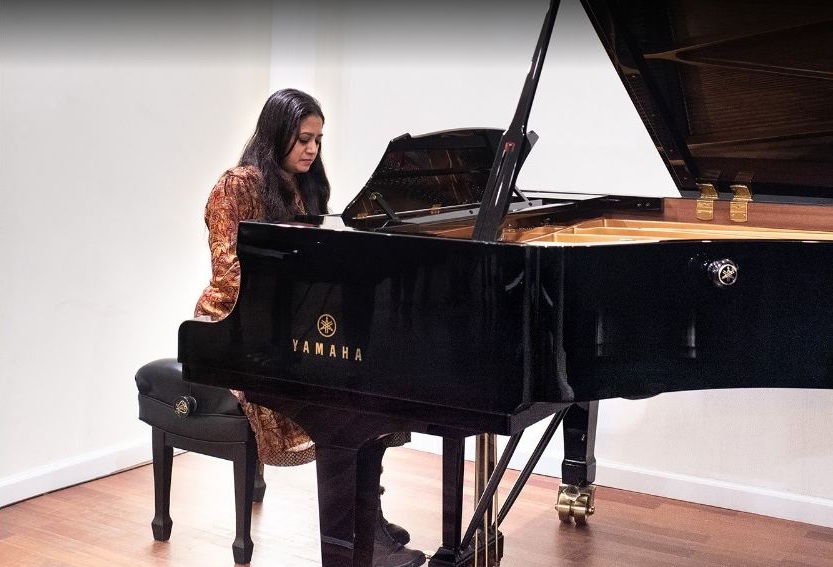(September 29, 2023) Sitting in a long emerald dress, musician Charu Suri creates a beautiful jazz raga by playing the black and white keys of the piano in front of her. “I am taking the sounds I grew up with as a kid and adding some of the chords of your hit pop music,” explains the New Jersey-based artist in one of her videos on YouTube. It’s the amalgamation of ragas and jazz that has put this Indian-origin artist’s latest album Rags & Ragas at #3 on the iTunes US jazz charts and #2 in Kenya. “Rags and Ragas is an ode to the birthplace of jazz, New Orleans, a city that also got me started on my jazz journey,” she told HT in an interview, adding, “I wanted to showcase the breadth of the raga tradition, and how ragas could transform into jazz.”
It was at the young age of five, living in Nigeria with her family who had recently relocated owing to her dad’s new job at a record label, that she discovered a piano in one corner of her home. One day she sat playing the piano and never stopped. She grew up surrounded by music as her grandmother Savithri Surianarain was a Carnatic vocalist who played the veena too and even taught Charu. Her father, on the other hand, loves jazz and waltzes along with Western Classical music.

Indian composer Charu Suri
Taking up the piano classes, she fell in love with the instrument. So much so that when they returned to Chennai, she continued her piano classes and spent her formative years learning Western classical music. It was during these early years that Charu had her aha moment about composing music. “I wanted to compose since I was five, and I would end up playing Beethoven and Mozart. But my piano teacher told me, ‘That’s great. But we want to hear you.’ That’s when I realised that composing is not about repurposing, rehashing, and redoing the tons of stuff that we have heard. Composing is about creating something new. That’s when I started taking risks and pushing musical boundaries.”
At the young age of 15, she won an international piano playing contest, which helped her bag a place at Princeton University to study classical literature and musical performance. Those years at the university shaped her as a composer, so much so that a piece composed by her for chamber orchestra was performed by French-American cellist Yo-Yo Ma and American bassist and composer Edgar Meyer at Princeton University.
However, graduating from college came with its share of the pressure of releasing her compositions soon. “That’s a very dangerous mentality to subscribe to because you end up following in other people’s footsteps and never really finding your voice,” she added. That’s when she decided to take a break and start to travel the world and find her voice as a freelance reporter. In no time, Charu became an award-winning travel journalist with articles in The Washington Post and The New York Times.

However, a gig by the Preservation Hall Jazz Band in New Orleans in 2018 reignited her passion for music and inspired her to return to the world of composition. Her first EP – The New American Songbook – a jazz record came out in 2019. It was the same year that she became one of the few Indian-born composers to play at New York’s Carnegie Hall. By this time, she had realised that composers like Beethoven and Debussy brought their signature style and voice, and she too needed to bring her heritage into jazz. That’s when she began taking lessons in jazz along with resuming lessons in Indian classical music, and started delving more into raga jazz. She released three albums – The Book of Ragas Vol 1 and Vol 2 and Ragas and Waltzes – in quick succession. Her compositions weave techniques and sounds from several places including India, Europe, and Africa.
Her latest album Rags and Ragas perfectly showcases her versatility and breadth of ragas by blending jazz with Indian classical music. “I have folded in everything from Bhairavi to Bageshri, two completely diametric opposites in terms of what ragas can do,” she said. With her music, Charu wants the listeners to know that one can’t put Eastern music and Western music in watertight compartments, instead, they are parallels. With her album topping the charts, she is now gearing up for a concert at the Grammy Museum in Los Angeles in October this year.
For Charu, the musical journey has been spiritual. “To feel the music was something that I learnt by listening to tons of records by Bill Evans and Miles Davis. When Bill Evans was asked what is jazz, he said, it’s a feeling. It took me a while to realise that anyone can write a tune but not everyone can write a tune that has an emotional touch. That takes years to experience life. That’s the greatest aspect of my musical journey.”
- Follow Charu Suri on Instagram




